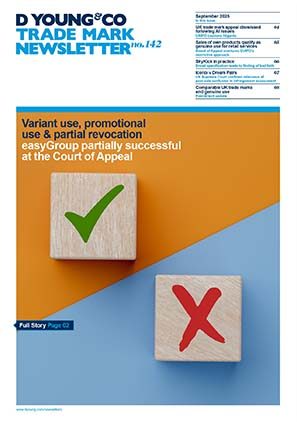Neuschwanstein: Bundesverband Souvenir - Geschenke - Ehrenpreise eV v EUIPO
This is a case in which the European Court of Justice has made a decision on a mark consisting of a German word that is not in accordance with the decision made by the German Federal Supreme Court on the same mark.
The case concerns an appeal against the decision of the General Court on the trade mark NEUSCHWANSTEIN. NEUSCHWANSTEIN is the name of a beautiful castle in Bavaria. The castle has featured in films such as CHITTY CHITTY BANG BANG and is a museum and a tourist destination.
Freistaat, the Bavarian federal state, successfully registered the mark NEUSCHWANSTEIN in several classes. Bundesverband applied to invalidate the registration on the grounds that it was a geographical location and that the application had been filed in bad faith. The Cancellation Division decided that the mark did not consist of an indication of geographical origin and the application was not considered to have been filed in bad faith. The Board of Appeal agreed with the Cancellation Division and the General court dismissed the appeal.
The appellant’s arguments, that the General Court had incorrectly decided that the public’s degree of attentiveness is higher for certain goods and services, that the mark is colourful and original and that the name is not geographical because it is primarily the name of a museum, failed: the appellant did not support its arguments by showing any distortion of the facts.
The appellant submitted that the General Court was incorrect in connection with the descriptiveness of the mark, referring to the Windsurfing Chiemsee case and the fact that geographical names should remain available for others to use on souvenir items. The General Court had found that the name did not signify to the public a place of manufacture or marketing of souvenir products but a museum location with a focus on heritage conservation. The court agreed with the General Court that the goods covered by the application are everyday consumer goods and not souvenir items and that the services are everyday services that relate to the management and operation of the castle.
The court stated that, just because the goods might be sold as souvenir items, it is irrelevant for the purpose of assessing the descriptive character of the name:
the souvenir function ascribed to a product is not an objective characteristic inherent to the nature of that product, since that function is determined by the free will of the buyer and is focussed solely on that buyer’s intentions.
The court concluded that the public would not consider that the name indicated an essential characteristic of the goods and/or services and the appellant had not proved that the name was indicative of the geographical origin of the goods.
The appellant had pointed out that the German Federal Supreme Court had cancelled registration of the same name as a national trade mark with respect to similar goods but, as usual, the General Court was not obliged to follow a national decision.
Finally, the appellant contended bad faith on the basis that the application was filed to prevent third parties from using the sign on souvenirs. This failed as the appellant could not prove this basis for the filing; the court pointed out that registration may have been sought for the legitimate reason that the applicant may be aware of a third party who is new to the market and who might be trying to take advantage of the applicant’s brand.
In short
The state has achieved registration of the name of the castle and it will be interesting to see if the brand is strongly enforced.

